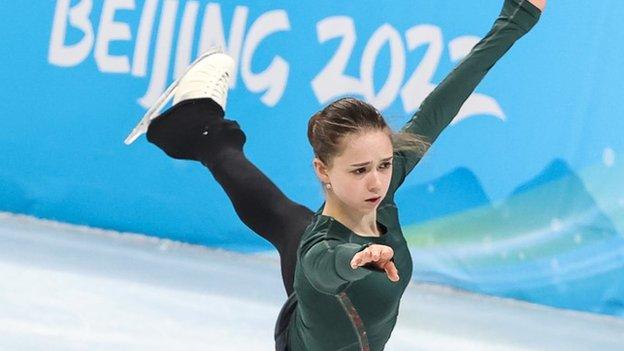[ad_1]

Kamila Valieva (a 15-year-old Russian figure skater) failed a drug screening in December.
Valieva, the first female figure skater to attempt a quadruple leap at the Olympics, won her team the title last Monday. She had a sample taken at the Russian Figure Skating Championships, St Petersburg, 25 December.
The positive result was reported only on Tuesday, the day after her team won gold. However, it came before the medal ceremony.
Trimetazidine was found to be positive in Valieva’s blood. This drug is used to prevent angina attacks and is banned because it is a cardiac metabolic modator. It has also been shown to increase physical efficiency.
After a series of appeals, this case will be brought to the Court of Arbitration for Sport to make a final decision. A spokesperson for International Olympic Committee Mark Adams stated that he desired a resolution “as soon as possible”.
The Cas hearing will determine if the medals for the team event, in which Canada finished fourth and Japan came second, will be awarded.
Russian Olympic Committee (ROC), a spokeswoman, said that the Russian Olympic Committee will take “comprehensive measures” to safeguard the rights and interests and preserve the Olympic gold medal.
Rusada, Russia’s anti-doping agency, said Friday that it is looking into Valieva’s support team to “identify the circumstances of an anti-doping rule violations”.
Cas will now be able to hear the case, before Valieva’s appearance at the individual women’s figure skate event on Tuesday, 15 February.
Timeline
According to the International Testing Agency (ITA), Valieva had a sample taken on 25 DecemberAt the Russian Figure Skating Championships, St Petersburg.
The sample was sent in to the World Anti-Doping Agency (Wada), a laboratory that is accredited in Stockholm, Sweden.
Valieva participated in the European Figure Skating Championships, Tallinn, Estonia. JanuaryThe positive test was held between the Winter Olympics and the Winter Olympics. Russian won the women’s singles.
The ROC stated that Valieva had taken negative samples at the Europeans as well as before the Beijing Winter Olympics. It also said that, “Considering the fact that the positive doping test of the athlete wasn’t collected during the Olympic Games,” the results of both the athlete’s and team events during the Olympic Games are not automatically under review.”
An adverse finding was reported 7 February Valieva was informed of the positive outcome 8 February.
Valieva was temporarily suspended, but she challenged it and the Russian Anti-Doping Agency Rusada agreed to lift it. 9 February This enabled her to continue at Beijing Games.
Due to her age Valieva was not confirmed by the Olympic Committee as Valieva, who was the “legal issue” that delayed the medal ceremony. It was later widely reported in the media. 10 February. The ITA confirmed those reportsOn 11 FebruaryBecause of “heightened public concern”.
International Olympic Committee, Wada, and International Skating Union (ISU), have all appealed against Rusada’s lifting of the provisional banning, with the ISU asking the Court of Arbitration for Sport to reinstate it.
According to the ITA, the “reasoned decision” (including the reasons for which the provisional suspension was lifted) will be sent out shortly to all parties.
Why the delay?
Stanislav Pozdnyakov, president of the Russian Olympic Committee, told the Tass News Agency the long time gap between the 25 Dec test and the 8 Feb result appeared suspicious and that he has “serious doubts about the process”.
Rusada (Russian anti-doping agency) claimed that Valieva was delayed in processing her sample because of Covid-19 cases at a Swedish laboratory that was testing them.
Reaction: Medallists deserved their moments
Valieva is a favorite for the women’s singles and has been seen training at Beijing’s Capital Indoor Stadium.
Eric Myles is the chief sport officer at the Canadian Olympic Committee. He stated that they have the same questions about the team figure skate case as everyone else.
“It is important that fair processes are followed and the integrity of sports is maintained. We hope that this can be resolved quickly so that medallists receive the medal moment they earned in Beijing.
Russian athletes compete under the Russian Olympic Committee’s name, as Russia was banned by Wada for two years in 2019 from its state-sponsored doping program.
Russia cannot have an athlete represent it at the Olympics or Paralympics.
The ban was initially for four years. However, it was reduced to just two years by Cas.
Katarina Witt of Germany, two-time Olympic figure skate champion, stated: “What they knowingly done to her, if true,” and it makes my athlete’s heart ache infinitely.
“Kamila Valieva, a child prodigy and young girl, has captivated the entire world at just 15 years old. She is dependent on adults, and it is not her fault.”
Travis Tygart, the head of the United States Anti-Doping Agency, stated that “it is a catastrophic failure in the system to allow her sample not to be reported back close to 5 weeks. And then it gets reported the following day.”
Analyse
BBC senior sports news reporter Laura Scott in Beijing
The ITA has confirmed that Kamila Valieva (15 years old) from Russia, who was a prodigy in Russia, tested positive for a banned substance after days of speculation.
Valieva is the favorite to win gold in the women’s solo figure skating event. It starts Tuesday (15 Feb). The whole process must be accelerated.
This is the story of a 15-year old athlete. Concerns have been raised about her welfare and the involvement of others.
It’s easy to feel depressed deja vu as we once again find ourselves at the Olympics. There is a doping scandal and it involves Russia.
Russia is still under sanctions, but many people see them as Russia. Many will wonder if they should have been allowed into competition given Russia’s doping history.

